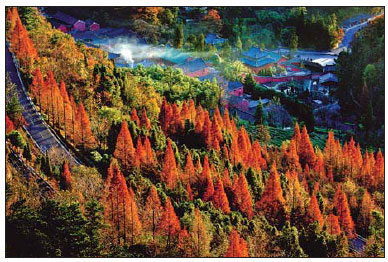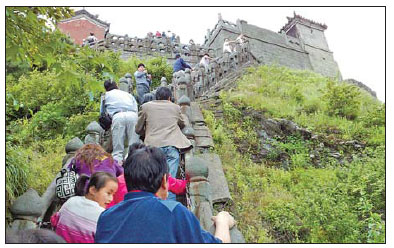|
|

Overlooking a sea of clouds, Golden Temple is a peak attraction of Wudang Mountains in Hubei province. Provided to China Daily
|
|

The Purple Cloud complex in Wudang Mountains. Provided to China Daily
|
|

The path to Golden Temple is crowded with visitors. Raymond Zhou / China Daily
|

Wudang Mountains in Hubei province, known for their Taoist monasteries as well as spawning a martial arts style popular the world over, are worth days of exploration, Raymond Zhou discovers.
When the New York-based hip-hop group Wu-Tang Clan burst on the scene in early the 1990s, I was scratching my head as to what the name meant. It must be Chinese, I thought. But this was the era before Wikipedia, so I gave up after asking a few people around me and being met with shrugs.
Years later, when I was passing the archway entrance to Wudang Mountains, the epiphany finally dawned on me: It was Wudang, the old spelling, or the Hong Kong spelling. Martial arts of the Wudang style or clan have been dramatized in hundreds of films. I wonder whether the Wu-Tang Clan members knew there is actually a real place of their namesake and what would go through their minds if they stood in front of the Golden Temple on top of the Heavenly Pillar Peak.
On the day I was there, it was elbow to elbow, and I was concentrating on not bumping into the next person. People were jostling for photo-taking positions. There was no way you could clear the background for a picture. From whatever angle you shot, it would be a group photo. So, I turned around for a bird's-eye view of the structures. But clouds started rolling in. Pretty soon, I was feeling like the Taoist monks who were here hundreds of years ago striving for a moment on cloud nine.
Wudang is a Taoist mecca. Inside the Purple Cloud complex, men in black or white coats and black pants were practicing tai chi. There were quite a few Caucasians among them. The deliberate movements seemed to be in step with the billowing smoke that wafted out of the giant incense burner atop a long flight of stone stairs. A Taoist monk in a black silk coat, with a white beard, was offering a fortune-telling service while thumbing through several volumes of Taoist scriptures.
You'd better not ask him his age. While Western custom dictates women be spared this question, Taoist monks enjoy this privilege because their ultimate goal is immortality and age is a reminder of mortality. And unless you are a close friend, you should not ask why or how he took on the religion.
There is one person whose tale is known to all, though. He is the mythological Great Emperor Zhenwu, for whom the mountains are named. (It's the same "wu", and the word "dang" is from a phrase roughly meaning: "Only Zhenwu fits the place".)
Myth has it that on the west horizon of the ocean there is a kingdom where peace and goodness rule. One day the empress was strolling in the imperial garden when heaven opened a gate out of which the sun was thrown down. It turned into a red fruit and flew down her throat. That became her version of an immaculate conception.
Fourteen months later, she gave birth to a beautiful son out of her left armpit. That kid, Zhenwu, grew up to be a talented and good-looking man. But he had no interest whatsoever in inheriting the throne. At age 15, he left his parents and all worldly pleasures to seek immortality.
Zhenwu sailed the sea and arrived at these mountains. But his mother, heartbroken, followed him. When she spotted him on a slope, she shouted: "My son, come back!" She did it 18 times as she walked down the slope's 18 steps. On the opposite side of the mountain, the son responded 18 times as he climbed up 18 steps. That place was later named "Prince Slope" and "18 Up Bends" or "18 Down Bends".
The Prince Slope is not far from the departure station of the cable car that will take you to Golden Temple. The Slope is now dominated by buildings first constructed in 1413 and based on the Zhenwu scriptures. This 16,000 square meter complex is perched on a slope of 60 degrees, with Lion's Peak as its backdrop and a waterfall and the curving road forming a natural frame.
The Yellow River Wall of Nine Curves, 1.5 meters thick and 2.5 meters high, is said to embody the nine virtues of Taoism and will bless those who make contributions to the religion. The place where the prince studied is hilariously anachronistic. The myth is supposed to be thousands of years older than the building.
Back to the legend. At one point, the empress got hold of her son. In a desperate act to break away from the constraints of family bonds, the prince, wielding a sword, cut off the part of his clothes his mother was pulling on. The severed pieces of cloth floated in the air and finally descended on the River Han, where they became two islets. Somehow, despair enhanced her strength. Again she caught up with him. This time he drew his sword and parted the mountain, whose valley was soon submerged in water. The Sword River, as it is now called, finally stopped the royal mother from further pursuit. But she cried so many tears there is now a Pool of Tears.
Prince Zhenwu practiced Taoism for many years, yet he did not attain enlightenment. He was about to give up when he encountered an elderly woman sharpening an iron rod. "What's it for?" he stepped forward and asked. "I'm making a needle out of it," she answered. "You must be joking." The old lady was not offended: "The more I work on it, the smaller it becomes, and one day it will be a needle sharp enough for embroidery."
With that she vanished. When he looked up, he saw her on a cloud. "Wow, you're a deity taking a human shape!"
That phrase about an iron rod reduced to a needle has found its way into the Chinese lexicon, to denote persistence. And Wudang has a well in commemoration of that episode. Most of the mountain's scenic spots, including the Flying Up Cliff, where the prince allegedly achieved his immortality after 42 years of practice, are imbued with beautiful fantasies and ancient mythologies and stewed into a Taoist potion.
But you don't have to be a Taoist to appreciate its beauty. Embraced by nature and its misty vicissitudes, the structures, mostly built in the Yongle years of the Ming Dynasty (1368-1644) at the same time the Forbidden City in Beijing was under construction, have an imperial grandeur, yet are toned down by a simplicity and restraint.
Apart from the swarm of humanity, especially on public holidays and at the entrance of the cable car, the place is ideal for fantasy writers and martial arts aficionados. Some of the buildings seem to have been carved out of the cliff, and one's affinity to the great unknown is compounded by cooler-than-usual weather high in the mountains and drifting clouds that add mystique to the scene.
If possible, one should attempt the climb up Heavenly Pillar Peak, a six-hour trek back and forth, which will give you a taste of what was involved in an ancient Taoist pilgrimage. At least, one can take the cable car up and hike down. You can even pace your descent with the music of Wu-Tang Clan.
(China Daily 04/07/2011 page19)
|